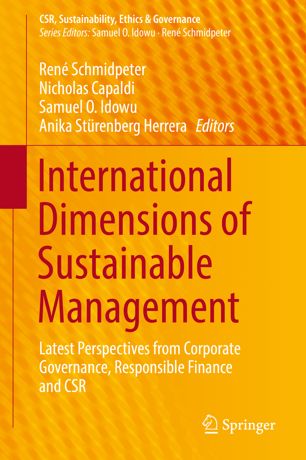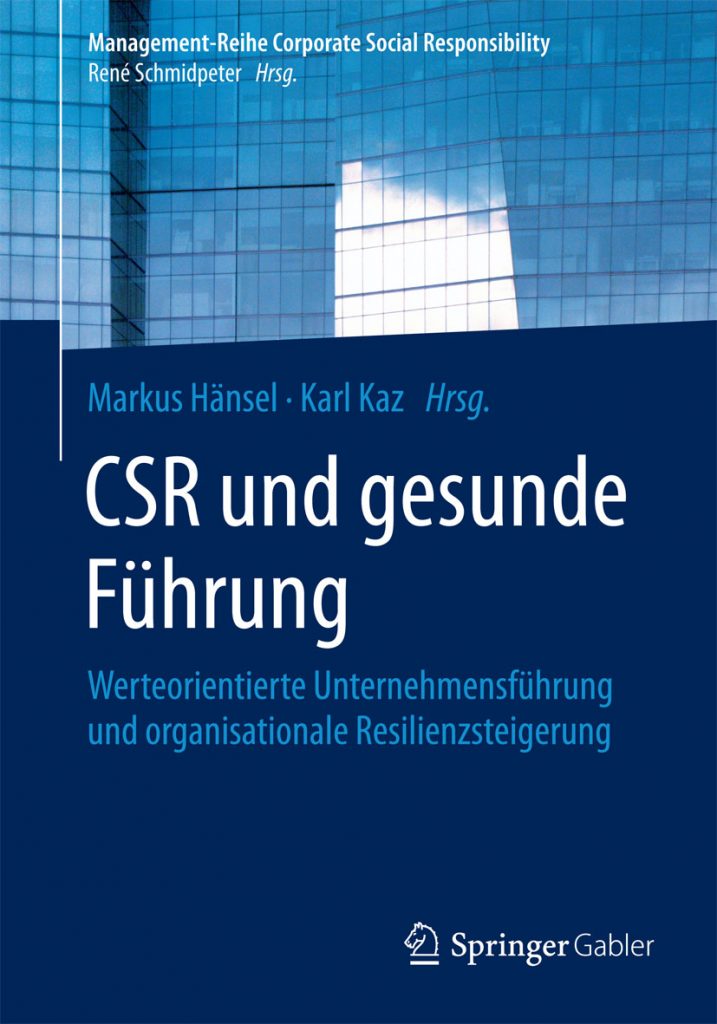CSR und Gesunde Führung – Werteorientierte Unternehmensführung und organisationale Resilienzsteigerung
Autoren: Markus Hänsel, Karl Kaz (Hg.), Springer 2016 – Inhalt, Verlagsinfo
Die Gesundheit von Führungskräften wie auch von Mitarbeitern steht in der komplexen und dynamischen Berufswelt immer mehr unter Druck: Burnout, Depression und Präsentismus sind verbreitete Symptome mit drastischen Auswirkungen auf die Unternehmen. Der hier vorgestellte Ansatz gesunder Führung geht dabei über das klassische berufliche Gesundheitsmanagement (BGM) hinaus – er positioniert Gesundheit als gleichrangigen unternehmerischen Wert ebenso wie Leistung, Exzellenz oder Innovation.
Nachhaltige Leistungsfähigkeit bei steigenden Anforderungen und hoher Turbulenz wird nur erreicht, wenn sowohl Menschen als auch Organisationen eine rubuste Resilienz, d.h. Widerstands- und Transformationsfähigkeit, entwickeln – und gesunde Führung eine Grundhaltung im gelebten Führungshandeln wird.
Resiliente Führungskräfte brauchen resiliente Organisationen – und umgekehrt! Gesunde Führung basiert auf einem systemischen Grundkonzept, dass die Förderung individueller Gesundheitskompetenzen ebenso wie die Entwicklung der Führungskultur und den korrespondierenden Unternehmensstrukturen umfasst. Der Band zeigt daher sowohl konkrete Instrumente, die Führungskräfte für die Selbstanwendung nutzen können, als auch innovative OE/PE-Ansätze zur Förderung organisationaler Resilienz. Vier Beispiele werte- und gesundheitsorientierter Unternehmenskulturen (dm Drogeriemarkt, Upstaals Boom, STP Online, Cleanpower) stellen schließlich einen verdichteten Praxistransfer her.
 International Dimensions of Sustainable Management
International Dimensions of Sustainable Management
Editors: Schmidpeter, R., Capaldi, N., Idowu, S.O., Lotter, A. (Eds.)
– Building Resilience into the Organization
Editor: Kaz, Karl (Pages 69-85),(single payment poss.) Springer 2019 – content, publisher
Organizational resilience is defined as ability of an organization to anticipate, prepare for, respond, as well as adapt to incremental change and sudden disruptions in order to survive and prosper. In the last decade(s), organizations have often lost their “natural” resilience because there was a high priority on superficial efficiency over a long period. But an exaggerated focus on efficiency leads to brittleness and weakness in living systems. There is not enough redundancy and diversity anymore to buffer uncertainty and permanent changes. To (re)balance our organizations, we have to become more flexible and robust at the same time, and systems have to enhance diversity and be more open to different opinions and alternatives.
In the last 10 years, psychosocial diseases have grown tremendously in German-speaking countries, with days absent due to psychosocial diseases growing 100% in Germany during this time. The main reason is depression often caused by burnout syndrome. Usually burnout is treated as a personal problem. However, there is a connection between frequency of burnout and the corporate culture. Companies must therefore treat hidden conflicts and unhealthy structures in their systems. Sane leadership feels the responsibility to foster a health-conscious (salutogenesis) organization.
In German-speaking countries, more and more pioneers—often smaller- and medium-sized companies—are realizing successful businesses in connection with resilient culture and structures, a healthy work environment embedded in a trusty corporate culture, and a high-level CSR policy. In this chapter four short case studies in German-speaking countries are presented. Core statement of this chapter: Sane leadership and organizational resilience are the basis of widespread and all-embracing corporate social responsibility (CSR).

